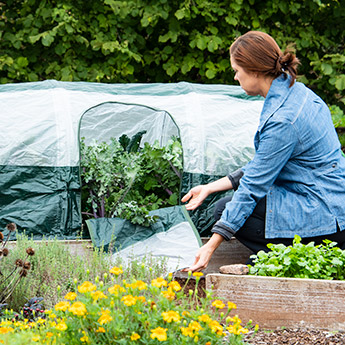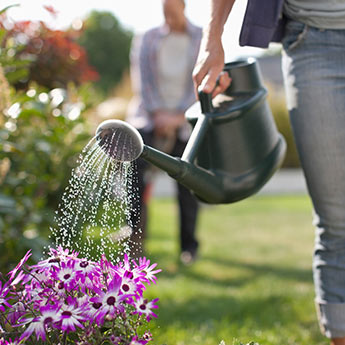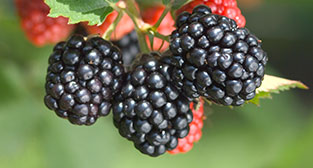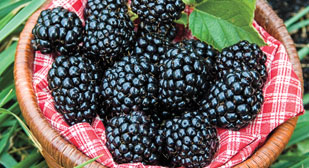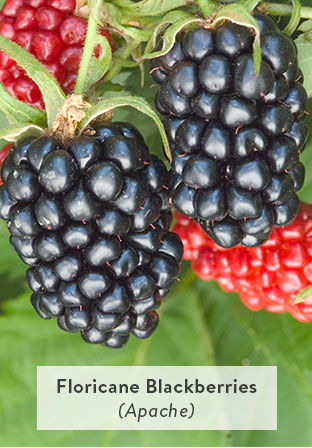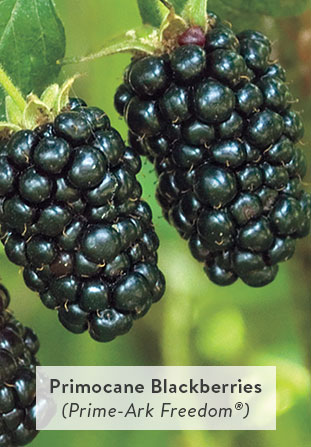Growing blackberries
—it just keeps getting better!
Growing up on a small farm, picking wild blackberries was an annual pastime. I look back on this period of my life with nostalgia because berry picking was a family affair perfectly timed with my birthday. Instead of cake, I often requested blackberry cobbler. I still cherish those thorny, chigger-filled days of my youth, but it's hard to be too wistful now that I've tasted the large, sweet and flavorful berries that modern blackberry varieties have to offer.
Blackberries are a very easy berry to grow. Once this native berry is ripe, get ready for an abundant harvest, picking every couple of days!
Blackberry plants for sale—how do I know what to buy?
There are many questions to consider when buying blackberries.
-
Should I grow primocanes or floricanes?
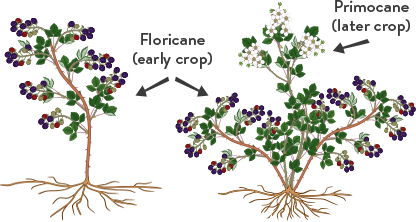
Floricanes bloom in early spring, yielding one crop of berries each year.
Primocanes yield two crops each year! The floricanes ripen first, then later the primocanes ripen.
-
Are thornless blackberries just as good as thorny varieties?
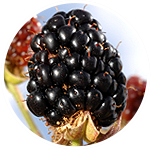
Thorny blackberries taste as good as thornless, and many ripen before thornless varieties.
-
Do you want
trailing or erect blackberries?- Trailing Blackberries
- These can be left to grow on the ground. If desired, tie to a trellis the second year.
- Erect Blackberries
- These do not require support, but it's helpful when fully loaded with berries.
-
Are blackberries even hardy in my area?

Cultivated berries are sweeter and larger than wild varieties—and usually grow in zones 5-9.
-
How difficult are blackberries to grow?
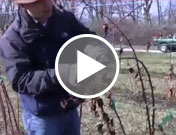
Check out our detailed
GARDENING
SUPPORT VIDEOS
for more information
How do blackberry plants grow?
Before we move any further, let me explain how blackberries typically grow.
Blackberries are perennial plants. New canes, or stems, are produced year after year. The first year's canes are called primocanes. They are usually fast growing, green and succulent. After these canes go through a winter and enter their second season of growth, they are called floricanes. Floricanes are the stems that bloom and produce the blackberry crop.
In the years that follow this second season, a blackberry plant will have both primocanes and floricanes at the same time. Recent breeding breakthroughs, however, have created plants that can now produce fruit on the primocanes, or the first season's growth.
Florican blackberries like Apache produce one crop per year. Primocane blackberries produce two crops per year. Prime-Ark Freedom is our customers' favorite primocane variety.
What are the advantages of floricane blackberries?
Floricane blackberries are still the workhorses of the blackberry patch. The cane grows, it overwinters, blooms the following year in early spring, yields fruit that ripens and delights your taste buds and makes you believe you're in blackberry heaven.
'Apache' and 'Natchez' are two classic, thornless floricane blackberries great for any garden. An even better variety to try is Gurney's own thornless 'Heaven Can Wait'. Its large berries are deliciously flavored, and the four-foot, erect canes are easy to manage.
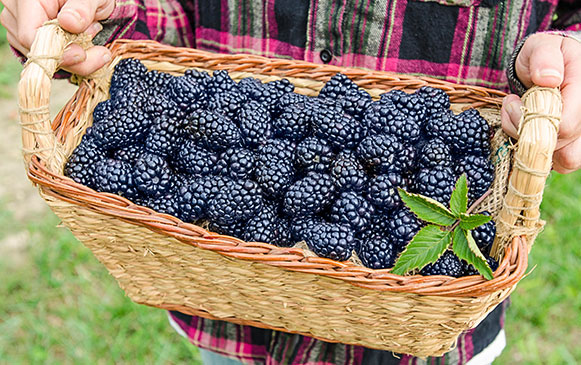
What makes primocane blackberries special?
The introduction of primocane fruiting has been one of the biggest breakthroughs in blackberry breeding, especially for the home gardener. The University of Arkansas pioneered these advancements and remains one of the world leaders in blackberry breeding.
There are two primary reasons primocanes are special—two crops in one year! The floricanes ripen first, then in late summer to early fall, the primocanes ripen. If you have a severe winter or late frost that damages the floricanes, you'll still get a crop of blackberries from the primocane growth.
'Prime-Jan' and 'Prime-Jim' were the first primocanes released. They were exciting introductions but have been eclipsed by several others. One of the best is 'Prime-Ark Freedom'. It has thornless canes, very good disease resistance and large berries with a deliciously sweet taste.
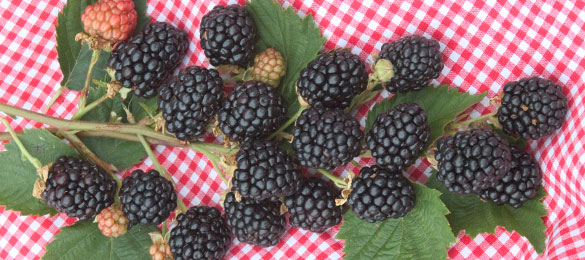
What about thornless blackberries?
Thornless blackberries have come a long way since the first varieties were introduced. In the early days, the sprawling canes produced heavy crops of large, beautiful berries. If wild blackberry bushes were your only point of reference, thornless varieties seemed like fantasy plants. The fantasy quickly disintegrated, however, once you tasted the sour berries. To avoid the mouth-puckering effects, the berries needed to be completely ripe and falling off the cane.
Times have changed. 'Triple Crown', named for the trifecta it achieves, has excellent flavor, productivity and vigor and sets a new standard for thornless blackberries—sweet berries with complex flavor and no aftertaste. They are a joy to pick and eat.
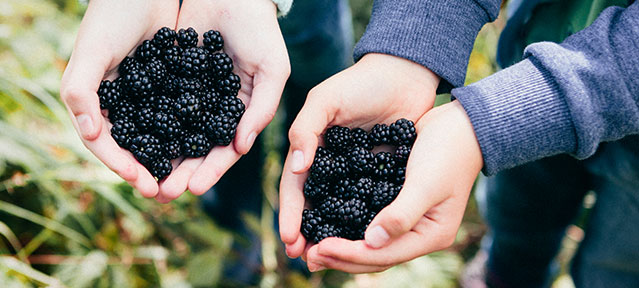
Are thorny blackberries as good as thornless?
Here's the point about thorny blackberries: They taste as good as thornless, and many ripen before thornless varieties. Gurney's own 'BlackMagic' primocane blackberry has it all—richly flavored berries, multiple crops, self-supporting canes and very good hot weather performance. When conditions are right, 'Black Magic' will produce three crops of berries in one year. Most primocane blackberries only produce two. With these outstanding qualities, it's easy to overlook a few prickly encounters.
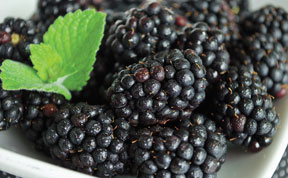
Blackberry Growth Habits

Trailing, semi-erect and erect blackberries—which is the best to grow?
Various blackberry varieties have different types of growth habit. Trailing blackberries like Gurney's Thornless Boysenberry can be left to grow on the ground. In year two, these same canes can be tied upon a trellis. Semi-erect blackberries are large, sprawling canes that need to be trained on a trellis during the first growing season. Erect blackberries technically do not require support, but it's helpful, especially when the fruiting canes are fully loaded with berries.
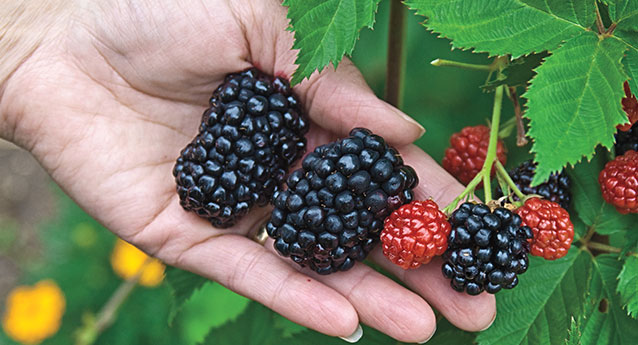
What should I look for when buying blackberry plants?
If you're buying at a garden center, you'll find that plants are usually potted and actively growing. When buying from a mail order catalog like Gurney's, they will either be potted or bareroot. Wherever you buy, make sure it's a reputable source. Avoid generic offerings that sell for a discount. These may be diseased or mislabeled.
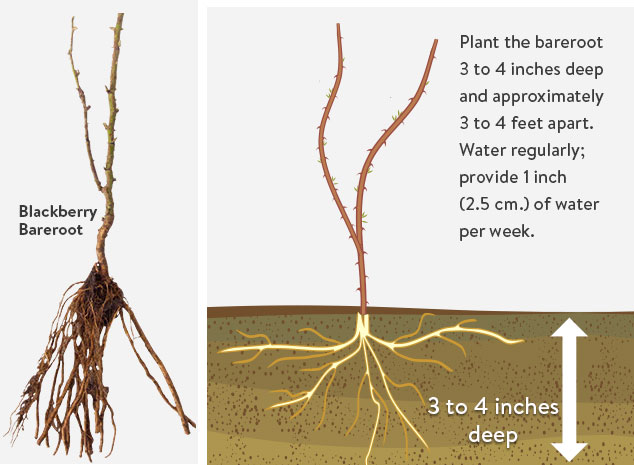
Are blackberries easy to grow?
The short answer is yes. Blackberries grow well in hardiness zones 5-9. When provided a few basic elements, they are one of the easiest fruits to grow. Give them full sun and well-drained soil. In poorly drained areas, raised beds are very effective. For more in-depth instructions on growing, pruning and trellising, consult your local extension agency.
Order now for your health and happiness!
Many things health professionals tell us to do to improve our health seem daunting. However, what could be easier than eating blackberries for good health? Blackberries are loaded with vitamins, antioxidants, fiber and other substances reportedly good for our health.
By reading through this information, you have completed step one. If this all seems too much, don't worry—you can't go wrong with any blackberry Gurney's has to offer. Our modern blackberry plants are easy to grow. You'll soon be enjoying sweet, flavorful berries that make rambles in the chigger-filled bramble patch a thing of the past. Order now for years of pleasure!



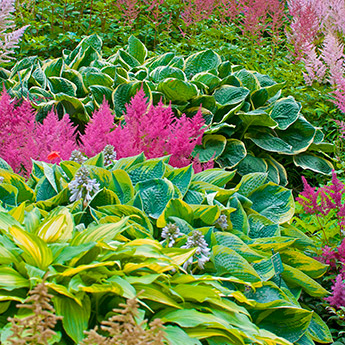
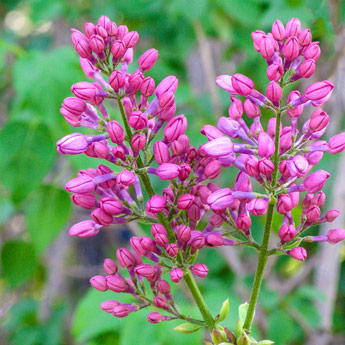
 Gardens Alive! & Supplies
Gardens Alive! & Supplies